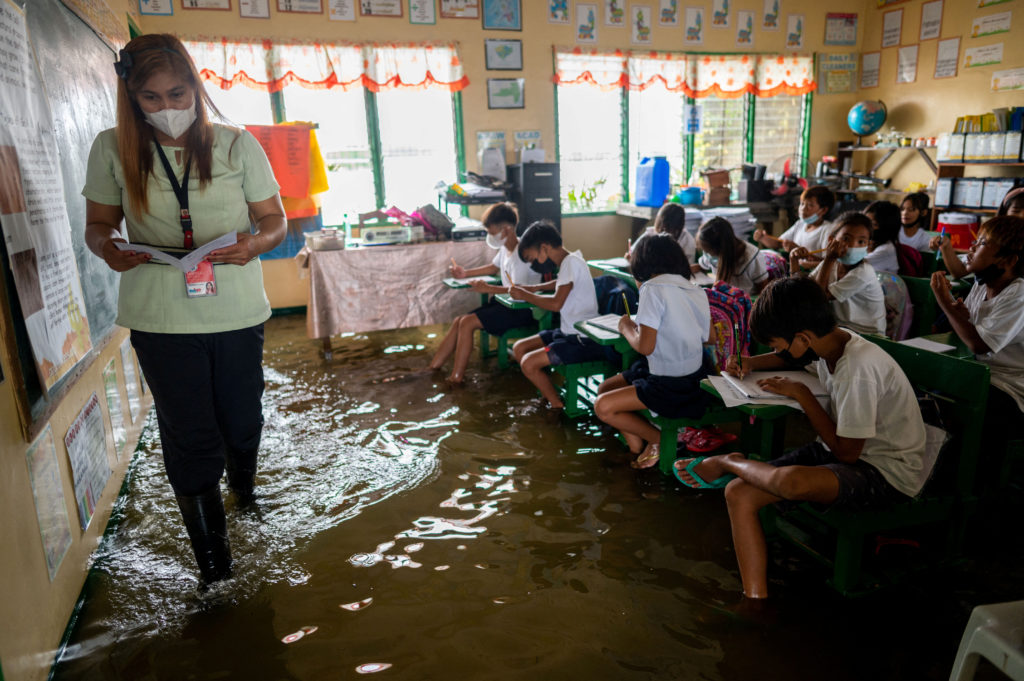Scorching Temperatures Lead To Widespread School Closures In The Philippines

Table of Contents
Health Risks Posed by Extreme Heat to Students and Teachers
The extreme heat poses significant health risks to students and teachers alike. Prolonged exposure to scorching temperatures can lead to heatstroke, a life-threatening condition characterized by a dangerously high body temperature. Dehydration is another major concern, resulting in fatigue, headaches, and decreased concentration, hindering both learning and teaching effectiveness. The impact is particularly severe on young children and individuals with pre-existing health conditions like heart disease or respiratory illnesses.
- Increased risk of heatstroke: Young children and those with pre-existing conditions are especially vulnerable to heatstroke, requiring immediate medical attention.
- Dehydration: Dehydration leads to fatigue, dizziness, and impaired cognitive function, making it difficult for students to focus and learn effectively. Teachers also suffer from decreased energy levels, impacting their ability to deliver quality instruction.
- Exacerbation of respiratory problems: Extreme heat can worsen respiratory conditions like asthma, leading to increased hospitalizations and missed school days.
- Potential for long-term health consequences: Repeated exposure to extreme heat can have long-term health consequences, impacting overall well-being and potentially leading to chronic illnesses.
Disruption to Education and Academic Calendar
The widespread school closures in the Philippines due to extreme heat have caused significant disruptions to the academic calendar. Thousands of students have missed valuable instructional time, leading to potential learning gaps and setbacks. The closures also create pressure on students to catch up on missed coursework, potentially increasing stress and anxiety. Moreover, delays in examinations and graduation ceremonies are possible, further compounding the negative impact on students' academic progress.
- Loss of instructional time: Every day of school closure represents a loss of valuable learning opportunities, impacting students' overall academic performance.
- Increased pressure on students: Students face added pressure to catch up on missed work, potentially leading to burnout and affecting their mental health.
- Challenges in maintaining consistent learning routines: The disruption of the regular school schedule disrupts learning routines, making it harder for students to maintain focus and engagement.
- Inequitable impact: Students from disadvantaged backgrounds are often disproportionately affected by school closures, as they may lack access to resources needed for alternative learning options.
Government Response and Contingency Plans
The Department of Education (DepEd) has responded to the crisis by issuing guidelines for schools to prioritize student safety during extreme heat. This includes measures such as adjusting school hours, implementing water breaks, and encouraging the use of light clothing. The DepEd has also explored alternative learning strategies, such as online classes and flexible learning modules, to minimize learning disruptions. However, the effectiveness of these strategies varies depending on factors like internet access and the availability of resources.
- Official announcements and guidelines: The DepEd has issued official statements and guidelines regarding school closures and safety measures.
- Provision of guidelines for schools: These guidelines aim to ensure student safety and well-being during periods of extreme heat.
- Implementation of flexible learning modalities: Online learning and flexible schedules are being implemented as alternatives to traditional classroom instruction.
- Support provided to students and teachers: Support mechanisms are being explored to assist students and teachers affected by the closures.
Long-Term Implications and Climate Change Concerns
The increasing frequency and intensity of heatwaves in the Philippines are directly linked to climate change. These extreme heat events pose a significant threat to the education system, demanding long-term strategies to mitigate their impact. This includes investing in climate-resilient school infrastructure, developing comprehensive heatwave preparedness plans, and advocating for stronger climate action.
- Increased frequency and intensity of heatwaves: Climate change is driving the increase in the frequency and intensity of heatwaves, making school closures more likely in the future.
- Need for climate-resilient school infrastructure: Schools need to be designed and built to withstand extreme weather events, including heatwaves.
- Importance of heatwave preparedness and emergency plans: Comprehensive plans are needed to address school closures and ensure student safety during extreme heat events.
- Advocacy for climate action: Stronger climate action is essential to protect children's education and well-being from the adverse effects of climate change.
Addressing the Urgent Need for Solutions Regarding School Closures in the Philippines Due to Extreme Heat
The widespread school closures in the Philippines due to extreme heat highlight a critical issue demanding immediate and comprehensive solutions. The health risks, educational disruptions, and long-term implications of these closures cannot be ignored. Addressing heat-related school closures requires a multi-pronged approach, including investment in climate-resilient infrastructure, the development of effective heatwave preparedness plans, and stronger government support for alternative learning strategies. We must also advocate for policies that address climate change and its devastating impact on education in the Philippines. Learn more about how you can help address this critical issue and prevent future Philippine school closures due to extreme temperatures. Support organizations working on climate change mitigation and adaptation, and urge your elected officials to prioritize climate action to protect the future of education in the Philippines.

Featured Posts
-
 Bar Roma Blog Tos Review Of This Toronto Bar
May 13, 2025
Bar Roma Blog Tos Review Of This Toronto Bar
May 13, 2025 -
 Mlb Baseball Home Run Prop Picks And Odds For April 26th
May 13, 2025
Mlb Baseball Home Run Prop Picks And Odds For April 26th
May 13, 2025 -
 The Educational Value Of Campus Farm Animals A Life Cycle Perspective
May 13, 2025
The Educational Value Of Campus Farm Animals A Life Cycle Perspective
May 13, 2025 -
 The Wild Summer Of Chris And Meg
May 13, 2025
The Wild Summer Of Chris And Meg
May 13, 2025 -
 Partynextdoor Addresses Apparent Diss Track Aimed At Tory Lanez
May 13, 2025
Partynextdoor Addresses Apparent Diss Track Aimed At Tory Lanez
May 13, 2025
